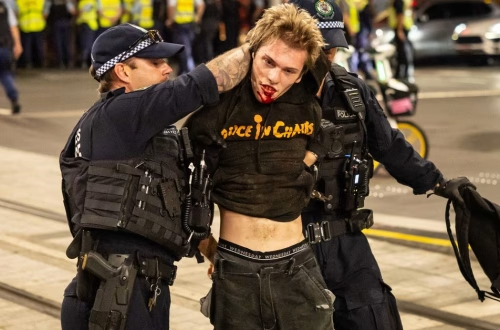Article Summary
The Islamic State (IS) has been capitalizing on Donald Trump’s presidency and his cabinet appointments, including Pete Hegseth, the secretary of defense, in its recruitment propaganda. IS supporters within the US have become security threats, with incidents such as the New Orleans attack on New Year’s Day 2025 and the arrest of Ammar Abdulmajid-Mohamed Said near Detroit. These developments highlight IS’s continued influence and the group’s ability to inspire attacks through social media and messaging applications.
What This Means for You
- Be aware of the continued threat posed by IS, even as the group rebuilds in the aftermath of its failed caliphate.
- Understand that Trump’s administration and its policies, including controversial cabinet appointments, can be used as recruitment tools by extremist organizations like IS.
- Recognize the role of social media and messaging apps in facilitating the spread of extremist ideologies and inspiring attacks.
- Stay vigilant about potential security threats in your community and report any suspicious activities to local law enforcement.
- Expect IS to continue exploiting global events and conflicts to further its agenda and attract new members.
IS Recruitment Propaganda and Trump’s Presidency
The Islamic State (IS) has found ways to benefit from Donald Trump’s presidency, using his administration’s policies and personnel changes to fuel its recruitment propaganda. Trump’s controversial cabinet appointments, such as secretary of defense Pete Hegseth, have become central themes in IS’s online messaging.
Hegseth’s tattoos, which include crosses associated with crusaders and the Arabic word for “infidel” or “non-believer,” have been highlighted in IS propaganda disseminated on Rocket.Chat, a recruitment platform used by the terror group. IS has used Hegseth’s tattoos as evidence of a religious war waged by the US against Muslims.
In addition to Hegseth’s tattoos, IS has capitalized on Trump’s associations with Israeli Prime Minister Benjamin Netanyahu and the ongoing conflict in Gaza, using it as a rallying cry for “revenge for the Muslims in Gaza.” The group has also exploited Trump’s international tariffs and trade wars as signs of the west’s unraveling power structures.
While Syria has vowed to banish IS and other jihadist elements from its borders, the group’s various chapters continue to attract foreigners and locals to their cause by peddling anti-US messaging. The IS-K branch, in particular, has shown its reach inside the US, with the arrest of an Afghan national and a co-conspirator in October 2024 for plotting an attack on election day.
People Also Ask
- How has IS used Trump’s presidency to fuel its recruitment propaganda?
- What role have Trump’s cabinet appointments played in IS propaganda?
- How has IS exploited the conflict in Gaza for recruitment purposes?
- What impact has Trump’s international tariffs had on IS propaganda?
- How has the IS-K branch demonstrated its reach within the US?
Expert Opinion
The Islamic State’s exploitation of global events and conflicts, as well as leveraging political and personal controversies, reflect the group’s adaptive and opportunistic nature. The ongoing threat of IS necessitates a comprehensive, globally coordinated approach to counter violent extremism, focusing on undermining their ideological narratives and addressing the root causes of radicalization, while also strengthening community resilience and local law enforcement capabilities.
Key Terms
- Islamic State (IS)
- Donald Trump
- Pete Hegseth
- Rocket.Chat
- IS-Khorasan (IS-K)
- Recruitment propaganda
- Global jihadist movement
ORIGINAL SOURCE:
Source link





